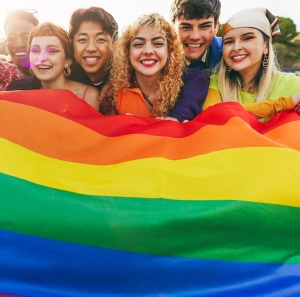School-based intervention aims to reduce LGBTQ+ youth behavioral health impact
June 22, 2022 / by Michele Carroll- Research
An estimated 83% of the 20 million LGBTQ+ people in the United States have experienced abuse or significant adverse childhood experiences (ACE) that have significantly impacted their mental health as adults compared to their heteronormative peers. This is associated with significantly higher rates of depression, anxiety, substance abuse and suicidal ideation and attempt, making the social and emotional experiences of LGBTQ+ youth a significant public health issue that impacts across society.
“Young people experience all these behavioral health disparities in part because of what we term minority stress, the victimization and harassment that they’re experiencing directly or indirectly from the world around them because of their sexual orientation and gender orientation,” said Harmony Rhoades, associate professor at the Suzanne Dworak-Peck School of Social Work.
To address these issues, the Center for LGBTQ+ Health Equity (CLHE) at USC Social Work, USC’s only research center dedicated to LGBTQ+ issues, created the first-of-its-kind Proud & Empowered school-based intervention aimed at preventing or reducing the impact of traumatic adolescent experiences before the damage is done. Study collaborators include co-investigator Zoe Corwin, professor in the USC Rossier School of Education, as well as USC Social Work's Rhoades, who is site principal investigator, doctoral student Rory O'Brien, project administrator John Senese and data management specialist Andrew Lopez. The researchers chose schools as the most effective and inclusive environment for the intervention because LGBTQ+ youth are more likely to be out at school than at home, and researchers can partner with school administrations.
“We know that a lot of LBGTQ+ youth have not disclosed their gender identity or sexual orientation to their families,” said Rhoades. “Families are not always a safe place.”
A novel intervention for LGBTQ+ youth
Proud & Empowered takes a two-prong approach that offers both individual tools and community engagement. First, a 10-week intervention working directly with LGBTQ+ youth in the school setting using a research-based curriculum that addresses the 10 most common domains of minority stress for sexual and gender minority youth. These range from “coming out, disclosure and decision making" to “families of origin and the family we create” to “school-related stress and resilience.” The program is designed to reduce minority stress among LGBTQ+ youth, but also to provide coping skills and improve resiliency when these events do occur.
The second component, called “Make Space,” is a community intervention that occurs in the second semester and is aimed at creating a safer, more supportive school environment to help address both social justice and behavioral health. Student opinion leaders are recruited and offered LGBTQ+ awareness and community organizing training, and a budget to implement the social justice project of their choice across their school.
Rhoades notes that the community component is vital. “You can give an individual LGBTQ+ adolescent all of the coping and resilience skills in the world, but if you're still in a really negative environment there’s only so much that coping is actually going to help,” she said.
Pre- and post-intervention evaluations show that sexual and gender minority adolescents who participate in the Proud & Empowered program are less likely to experience feelings of depression or anxiety and are more likely to have better coping mechanisms, such as an adaptive coping mechanism of reaching out to a friend for support.
“Maybe we can't help the youth to not face all these stressors, but we can make them a little bit more resilient,” said Jack Senese, CLHE research project administrator and lead facilitator for the intervention study.
Expanding across Los Angeles and beyond
Nearly a decade in the making, the Proud & Empowered intervention, as well as the Sexual Minority Adolescent Stress Inventory (SMASI) assessment instrument used to evaluate its impact, were developed by Jeremy Goldbach, CLHE founder and professor at the Brown School of Social Work at Washington University in St. Louis. Goldbach and Rhoades found that there were no scientifically valid assessment instruments or accurate counts addressing adolescent gender and sexual minority stress, nor research-based interventions to address it.
The CHLE research team conducted a successful feasibility study of Proud & Empowered at four high schools in Pasadena in 2019-2020. They are now expanding the program into 24 schools across Los Angeles County over the next five years using a grant from the National Institutes of Health to gather further data and fine tune the program.
CHLE plans to adapt the program to be implemented in areas where schools and communities may not be as accepting, but where LGBTQ+ adolescents are even more in need of a safe space and coping tools. They are currently considering a virtual Proud & Empowered curriculum that could be facilitated through local LGBTQ+ centers or other community organizations.
Rhoades says that the social work discipline is uniquely suited to address social justice issues such as LGBTQ+ health equity in a way that bridges research and impact.
“There is nothing we do in social work in terms of research that wouldn't also be at home in a school of public health or sociology or modern anthropology,” Rhoades said. “But, from my perspective, what we do uniquely well is prioritize translating that research into interventions to actually help people, and I think that's a great place to be.”
To reference the work of our faculty online, we ask that you directly quote their work where possible and attribute it to "FACULTY NAME, a professor in the USC Suzanne Dworak-Peck School of Social Work” (LINK: https://dworakpeck.usc.edu)
